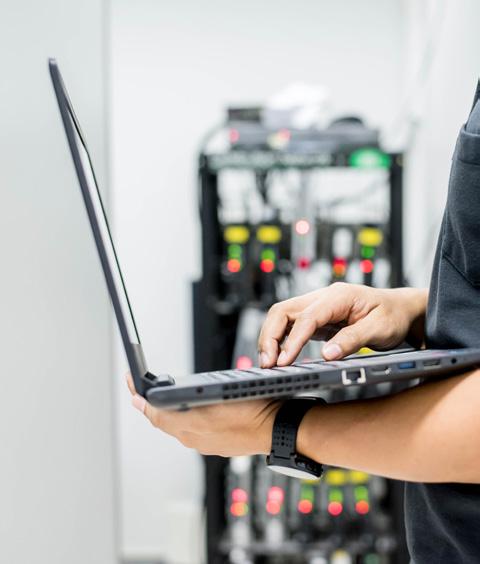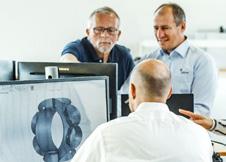
3 minute read
Energy
The energy system of the 2020s
In the performance contract dealing with the energy system of the 2020s, Danish Technological Institute will develop technologies, products and testing methods that support an optimal linking between smart energy components such as solar power plants, heat pumps, energy storage units and charging stations for electric cars.
We ensure that companies obtain access to knowledge about, for example, standardisation, protocols, data security and regulatory frameworks. We also construct and demonstrate the performance of facilities that test several energy components in a single dynamic.
With the knowledge we have attained and the facilities we have developed, the Institute will be able to test the operations of sector-linked systems under realistic and dynamic operating conditions.
“The energy system of the 2020s” performance contract is supported by the Danish Ministry for Higher Education and Science.
Large energy savings in buildings
With intelligent climate control, there is potential for major energy savings in large buildings. This also applies to the 500 buildings for which Neogrid Technologies ApS supplies intelligent, data-based heating control. Under the auspices of AI Denmark, we have helped Neogrid to identify the AI methods, algorithms and tools that, together with their existing technologies, optimally reduce energy waste in complex buildings.
”The partnership with AI Denmark has made us really aware of how we can develop our technology with AI tools so that we supply the services that our customers want. ”
- Henrik L. Stærmose, CEO, Neogrid Technologies ApS
The project is supported by the Danish Industry Foundation and it is a partnership between Danish Technological Institute, the Alexandra Institute, Aalborg University, Technical University of Denmark, University of Copenhagen and IT University of Copenhagen.
Denmark needs to be a trailblazing Power-to-X nation
Power-to-X is an important factor in the green transition since it allows us to store electricity from wind turbines and solar power as fuel. With Power-to-X, we can replace some of the fossil fuels with e-fuels that do not emit CO2. Together with the Institute, companies can develop new materials, components and processes for Power-to-X technologies while also obtaining access to our laboratories and testing facilities.
”In Denmark, we are already competitive within e-fuels based on electricity from solar power and wind turbines. If we continue to develop Power-to-X technologies, we can become a world leader in components. ”
- Christian Kallesøe, Danish Technological Institute
The “Energy storage and conversion” performance contract is supported by the Danish Ministry of Higher Education and Science.
High-temperature heat pumps for sustainable process heating
The Institute is working on developing and demonstrating three high-temperature heat pump technologies that use natural cooling methods such as steam, hydrocarbons and CO2.
The goal is to electrify a large part of the industrial process heating needs while also increasing energy efficiency and reducing the emission of greenhouse gases significantly. The results will be a key technology for the Danish process industry in terms of being able to meet the climate targets, and it will place the Danish heat pump industry in a leading role.
SuPrHeat is co-financed by EUDP. The participants in the project are: Danish Technological Institute, DTU Mechanics, Victor Energi og Køleteknik A/S, Alfa Laval, Arla Foods Amba, CS TechCom, Danfoss, Danish Crown, DuPont Nutrition Biosciences ApS, Fuchs Lubricants, Gea Bock, GEA Process Engineering, Hamburg Vacuum, Harboes Bryggeri A/S, Spirax Sarco and Viegand Maagøe.

Thermal topology optimisation is to create more energy-efficient products for Danish industry.
With this method, we test energy-related properties such as heat transfer, flow or cooling for the purposes of creating a simple yet powerful online tool. The goal is to provide industry with a quick and easy way of optimising, for example, industrial ovens, electric cars and cooling components.
The Easy-E project began in October 2020, and the first energy-saving prototypes have already been manufactured using 3D metal printing.

Danish Technological Institute is the project leader for this project, which is supported by EUDP. The knowledge partners include Technical University of Denmark and Oqton Danmark, while industry is represented by Aarsleff, Danfoss Cooling, Asetek, Bühler Group and GRAM Equipment.








